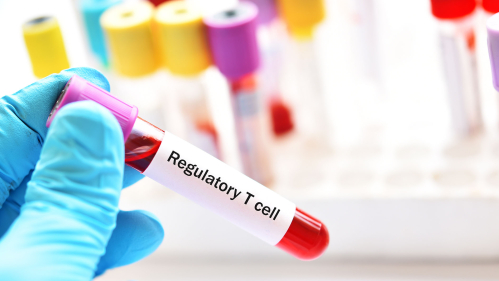Testing a Revolutionary Treatment Against Progressive Multiple Sclerosis

Rutgers Health researchers will enroll primary or secondary progressive multiple sclerosis (p-MS) patients to see if an engineered immune cell therapy can halt the progression of the autoimmune disease.
Mistargeted attacks by the body’s immune system and active central nervous system (CNS) inflammation underlie multiple sclerosis. As CNS damage accumulates, patients typically experience increasing difficulty swallowing, balancing, breathing, coordinating movements, generating strength and/or controlling their bladders and bowels. They also can suffer increasing levels of cognitive impairment.
The cellular therapy being tested is made by altering a specific subset of immune cells taken from each patient: regulatory T cells (Tregs). Tregs typically suppress inflammation and autoimmune disease and promote repair. The engineering process enables the modified Tregs to respond specifically to CNS inflammation. After administration, the engineered Tregs will circulate through the body. When they find the inflamed CNS tissue, they will activate to suppress inflammation, reset immune tolerance, limit tissue destruction and enable repair.
“The goal is to reprogram each patient’s Tregs to eliminate the inflammation within the central nervous system, limiting neuronal injury and restoring healthy nerves,” said Vikram Bhise, a professor of neurology at Rutgers Robert Wood Johnson Medical School who will oversee the trial in New Brunswick. “If treatment reverses disease progression, it will constitute a true breakthrough because existing treatments prevent relapses but don’t work for patients with p-MS.”
Roughly 1 million Americans have one of the four types of multiple sclerosis: clinically isolated syndrome, relapsing-remitting, secondary progressive and primary progressive. The phase I trial is open to patients with either secondary or primary p-MS without relapse activity, a particular genetic signature and evidence of CNS inflammation on MRI.
Abata Therapeutics is developing the therapy and financing the study to test the treatment’s safety and efficacy on at least a dozen patients at participating centers across North America. Abata recently announced clearance of their investigational new drug application by the U.S. Food and Drug Administration, allowing them to initiate the phase I trial. Bhise hopes to recruit between 3 and 5 patients at Robert Wood Johnson University Hospital.
The launch of this study was spearheaded by the medical school's Clinical Research Center in collaboration with the Rutgers Cancer Institute and Robert Wood Johnson University Hospital. The research center facilitates clinical and translational research, which lets patients access novel treatments and helps healthcare students and professionals train to use the most advanced tools and techniques.
In this trial, researchers at Abata Therapeutics will harvest Tregs from the patients’ blood samples, activate them to multiply, and genetically edit them in the laboratory. The engineered Tregs are then reinjected into patients.
This strategy could help patients with p-MS by preventing or stopping aggressive immune cells from attacking the nerves. The Tregs can also break down clusters of inflammatory cells and secrete nerve repair factors.
Robert Wood Johnson’s selection as a trial site hinged partly on the sheer scope of Rutgers Health operations and its ability to support the research with both a neurology team and a comprehensive cancer center — the Rutgers Cancer Institute — that already provides related types of cell therapies (CAR T cell therapy).
Participation in the study will require seven hospital visits in roughly 12 months, including several days of inpatient care around the Treg cell infusion.
“We’re telling people upfront that it’s a vigorous process requiring genuine investment,” Bhise said. “There are spinal taps and high-strength MRIs with a risk of side effects. It’s not easy, but it’s potentially life-changing.”


